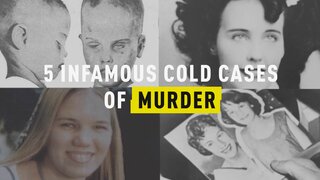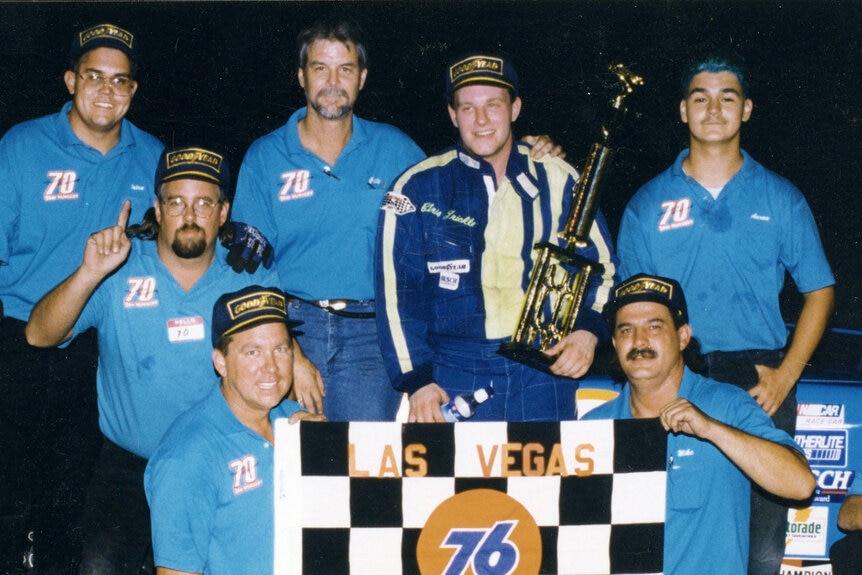Create a free profile to get unlimited access to exclusive videos, breaking news, sweepstakes, and more!
Who Killed NASCAR Driver Chris Trickle?
The race car driver's death led to the creation of the "Chris Trickle" law, allowing murder and manslaughter charges to be filed in Nevada no matter when a victim dies.

Chris Trickle was gunned down in a drive-by shooting along a Las Vegas road 26 years ago this month. The up-and-coming race car driver’s homicide was never solved, and the case is closed for the Las Vegas Metropolitan Police Department due to old statute of limitation laws. If someone confesses to his murder today, they cannot legally be convicted for the crime. But his death has brought about positive change for victims and their families in getting justice.
Trickle fell into a coma after he was shot in the head as he drove along Blue Diamond Road the night of Feb. 9, 1997, according to the Las Vegas Sun.
Trickle left his girlfriend, Jennifer Robinson, at the one-room apartment they shared at his parents’ home on West Torino Ave., near Blue Diamond Road, near Interstate 15, to hit tennis balls with his friend, Greg Hadges, according to Las Vegas Weekly. About 10 minutes after leaving home, Trickle was shot.
He suffered brain damage, and was unable to speak or care for himself, although he did emerge briefly from the coma in October of 1997. He underwent at least five major surgeries, and survived pneumonia. Then, 409 days later, he died on March 25, 1998 at the age of 25 of complications from the shooting, according to the Las Vegas Sun. His lungs aspirated, and he went into cardiac arrest in the emergency room at Sunrise Hospital, according to Las Vegas Weekly.
There were a range of theories as to what happened to Trickle, ranging from a “thrill kill” to some sort of road-rage incident, according to Sportscasting.com. There are no known witnesses to the crime.
“America’s Most Wanted” did two segments on the drive-by shooting, and the Trickle family offered a $35,000 reward for information. The Trickles know of at least four people who confessed to the crime, according to Las Vegas Weekly, but his father, Chuck, described the individuals as "people who just wanted to get their names in the paper."
Others theorize that it was a road-rage incident. Regardless, no one was ever arrested and charged with the murder.
It was an unimaginable loss for the racing world. Racing was in Trickle’s blood, making a splash at a young age. He was the nephew of famous NASCAR Cup Series driver Dick Trickle. He first started racing motorcycles and switched to stock cars at the age of 18, according to Sportscasting.com. He was the late models Rookie of the Year at a 3/8 mile track in Las Vegas in 1992.
“Chris Trickle laid the foundation for the many NASCAR stars who followed in his footsteps in Las Vegas,” Las Vegas Motor Speedway President Chris Powell told Oxygen.com in a statement. “It was Chris who first drew the attention of the TV cameras and the rest of the NASCAR world with his success in what was then known as the NASCAR Featherlite Southwest Series. While I have no doubt Chris would have been the first NASCAR star from Las Vegas, I think Kurt or Kyle Busch would both tell you Chris is the one who made NASCAR team owners take notice of the talent here in Las Vegas.”
Trickle’s sponsored Chevy Monte Carlo in the NASCAR Southwest Series was without a driver after the shooting, but owner Craig Keough wanted someone to race Trickle’s car in his honor. That turned out to be Kurt Busch — who won the race — and went on to win 32 times in the NASCAR Cup Series, according to Sportscasting.com.
As for the case, back in 1997, Nevada had what was called a “year and a day” rule that meant a victim had to die within that time period for murder or manslaughter charges to be filed. Chris Trickle died outside of this time period — so no charges can ever be brought against his killer.
In March of 1999, Nevada Governor Kenny Guinn signed what’s known as the “Chris Trickle” bill, which allows murder and manslaughter charges to be filed no matter when a victim dies. It applies to all murders committed after March 1999 — two years too late for Trickle’s family.
“25 years ago, I sponsored legislation in honor of Chris Trickle, a NASCAR driver and Las Vegas native who was murdered in a drive-by shooting,” U.S. Rep. Dina Titus — who was Nevada senate minority leader at the time — told Oxygen.com in a statement. “His killer must be brought to justice, no matter how long it takes. I'm glad to see his son, Cole, build on his father's legacy to raise awareness of this unsolved murder.”
Chris Trickle’s memory lives on in his children he was never able to know.
“After he was shot, one of his doctors had suggested to my grandparents that they save his sperm in case he lived and wanted to have kids one day,” Cole Trickle told Las Vegas NBC station KSNV. “I never had a chance to meet him, and I was born three years after he died.”
Two close family friends decided to have Cole and his twin sister Joelyn and raise them.
Cole still hopes all these years later he’ll one day find out who was responsible for murdering his father.
“I hope they know their actions really affected so many people in a way they can’t imagine,” Cole told KSNV. “I hope they know they need to come forward at some point and take responsibility for that.”
Cole told the station his interests aren’t in racing, but more in politics — and he hopes to make a difference like his father one day.



























